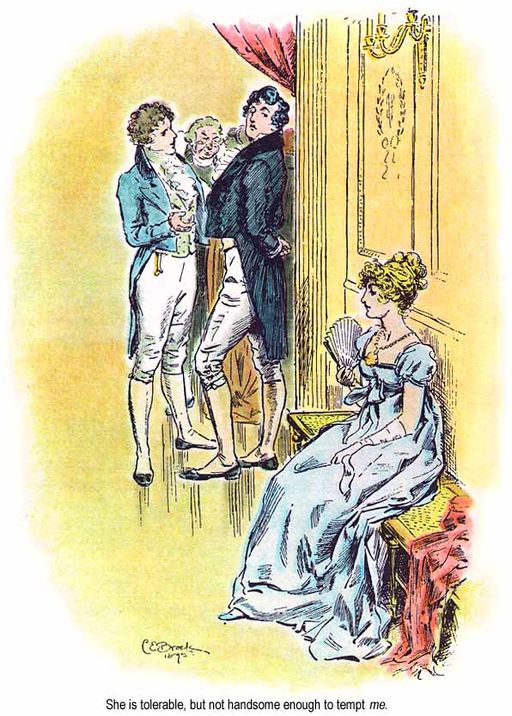
Dim the lights, add a few red Solo cups full of Milwaukee’s Best and this is just like a college dance.
A long, long time ago, I stole my mom’s VHS tapes of PBS’s Pride & Prejudice miniseries and took them to college with me. My friends and I spent two nights watching it in the common room of our freshman dorm. I don’t think we got through all six hours, but we got far enough through it for a lot of deep sighs and a couple of “Tell her/him how you feel, you fool”s. I’d already watched it with my mother and spent a lot of time watching, (and rewatching,) the scene in which Elizabeth tells off a hot and bothered Mr. Darcy, but I never read the novel.
After reading pages and pages of praise for Austen in Virginia Woolf’s A Room of One’s Own last month I couldn’t help myself; I downloaded it.
I finished Pride & Prejudice last night, and I get it! I understand Bridget Jones and the cult of Austen. I have seen the light!
It makes so much sense; Elizabeth Bennet is a relatable character. She and her sisters are still at large in the world. They have more freedom, but they’re still around, and they do pretty much the same things they’ve always done; they sit around their rooms and overanalyze their boyfriends, they visit relatives and they go to dances. (One of my friends pointed this out too; in a lot of ways, being at a college dance is like being at a ball. The same dynamic is still there, just with louder music and a lot of cheap beer and dancing that would shock every Bennet sister but Lydia.)
Mostly though, it was refreshing to read an old book and hear a voice that sounded like mine. I’ll bet that’s what the Austen cult is really all about. We don’t get a lot of points of view in period fiction like the viewpoint of Elizabeth Bennet. In contemporary fiction, like Dumas’s The Count of Montecristo, women are used as prizes or props or played for laughs. A woman’s quest for a husband is treated as comic relief. A woman’s quest for anything else is criminal.The words that Dumas puts into their mouths don’t sound like anything I’ve ever said or heard my friends say.
No wonder women have been drawn to Austen’s novel since she published it in 1813. In Pride & Prejudice, she treats the quest for a husband with dignity (and proves to the readers that grand dramas can happen in sitting rooms and ballrooms and on walks as well as on the high seas or the catacombs of Rome.) It’s a relief to catch female voices from the past that don’t sound strained or fake. Even the most unlikable women are three-dimensional and relatable. I can think of at least two Mrs. Bennets that I know in real life, a host of Lydias and a few Marys. I might even know a Lady Catherine.
I really wish I’d read the book when I was in college, but the cult of Austen put me off.
(In the interest of full disclosure, I did try, once, to read it. I was in the fifth grade and full of myself, because I was reading Jules Verne instead of Sweet Valley High, and I thought I was special because my religion teacher had complimented me when he saw Twenty Thousand Leagues Under the Sea on the corner of my desk. After I finished that, I was hungry for more praise, so I pulled Pride and Prejudice out of the school library and took it home to show my mom, who knew what I was doing. She tried to explain to me that even though I was an above average reader and might be able to understand the vocabulary, I probably wouldn’t understand the nuances of the story. And she was right. The famous first sentence – It is a truth universally acknowledged, that a single man in possession of a good fortune must be in want of a wife – was completely lost on a 10-year-old. After a day of trying to understand the Bennets and the Bingleys and why one rich old-timey English family would feel discriminated against by another old-timey rich English family, I gave up and quietly returned the book to the library.)
I wish I’d read it after my friends and I watched the miniseries in our dorm lounge. I doubt it would have made me more of an Elizabeth and less of a Lydia. It probably would have given me false hope, and I probably would have spent hours combing over my college campus for a Mr. Darcy who wasn’t there, but it might have made me an English major, and even if didn’t, I would have gained a new favorite book.

